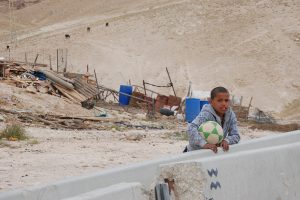Bedouin residents say can’t get permits to build; Israel says built illegally
It’s the first day of school. Seven-year-old Jafar, dressed neatly in a blue shirt and pants, clings tightly to his teacher’s hand. She sits patiently, occasionally patting the little boy on the head. The classroom in this one-room mud building is stifling – one fan mounted on the wall near the door does not provide sufficient ventilation. The 17 children here sit two to a desk, and study from 7:30 am to 1:30 pm five days a week.
“Miss,” one young girl says softly but urgently. Once she has teacher Maya Othman’s attention, she tilts her head towards a boy in the first row who is flipping through a workbook.
“Give it back to her,” Othman tells him quietly.
The little girl takes the book and carefully puts it in her backpack.
“She was worried about her book,” Othman told The Media Line. “She takes good care of it.”
It could be any second grade classroom anywhere in the world. But this is Khan al-Ahmar, a Bedouin encampment a few miles east of Jerusalem in Area C, the part of the West Bank that is under complete Israeli control. The school here, which was built out of natural materials by an Italian NGO called Vento di Terra, and currently serves 160 students, grades 1 – 9 from five communities in the surrounding area.
The school has become the focus of a legal battle between residents of the nearby settlement of Kfar Adumim and the Palestinian Authority. Khan al-Ahmar, a tangle of shacks made of corrugated metal and tents, has been home to Bedouin from the Jahalin tribe, who have lived here since the Israeli government expelled them from the Negev desert in 1952.
This holiday season, give to:
Truth and understanding
The Media Line's intrepid correspondents are in Israel, Gaza, Lebanon, Syria and Pakistan providing first-person reporting.
They all said they cover it.
We see it.
We report with just one agenda: the truth.


“I was born here and two of my children go to the school,” Eid Khamis Abu Daouk, a grizzled man who lives in a large tent here. “If they destroy this school it would be terrible for us. There is no transportation from here to any other village.”
He said that Israel wants the children here to go to school in Jericho, about 16 miles away or Ezeriyya in east Jerusalem, about ten miles away. Even a closer school in the Bedouin village of Jabal is not a good solution, he says.
“If there is no school here, it means girls won’t go to school at all,” he said. “Parents will not let their daughters leave the village to go to school.”
Teachers here say they are waiting to hear the results of a petition by the nearby settlement of Kfar Adumim to dismantle the school, which is built without a permit, just off Highway 1, the road that links Jerusalem to the Jordan Valley.
“We are talking about a school that was built in 2009 with no permits on land that belongs to Kfar Adumim,” Yael Cinnamon, the lawyer representing Kfar Adumim told The Media Line. “Then, seven years ago, the state said it would destroy the school and didn’t do it. We appealed and appealed and appealed. We filed a fourth appeal earlier this year and we are waiting for the state to respond.”

Photo: Dudi Saad/The Media Line

Photo: Dudi Saad/The Media Line
Israel’s new Minister of Defense Avigdor Lieberman is supposed to respond to the petition next week.
“The school in Khan al-Ahmar located in a building that was constructed without the proper permit,” a spokesman for the Coordinator of Government Activities in the Territories (COGAT) told The Media Line. “The school’s case was discussed several times in Supreme Court. The petition filed for this matter is still pending, and the government’s position will be delivered as part of its response to the petition in regards to the future of the school.
Palestinian officials say that the threats to close the Khan al-Ahmar school are part of an Israeli plan to prevent the advancement of Palestinian communities in Area C.
“Everyone is entitled to education; it is a fundamental human right,” said Prime Minister Hamdallah. “We stand with the community of Khan al Ahmar and we commend all those who are supporting it.”
Shlomo Lecker, an Israeli lawyer representing the Palestinians of Khan al-Ahmar, admits that the school was built without a permit. But, he says, it is simply not possible for Palestinians to get building permits at all, especially in Area C.
“The state never gave any building permits for Bedouin for any structure,” Lecker told The Media Line. “The court has said that the state must offer them an alternative before demolishing the school. We want the court to freeze the demolition order.”
According to the UN, Israel has destroyed over 700 Palestinian homes and other structures since January, leaving more than a thousand people homeless. Palestinian officials say Israel hopes to eventually annex Area C in the West Bank, which is where the majority of the Israeli citizens live.
The Bedouin who live here say they want the same things everyone else wants.
“I was born here in 1967 (the year Israel acquired the West Bank) and I just want to live in peace and quiet,” Jamal Mohamed Jahalin, the encampment’s mukhtar, or mayor, dressed in a long white robe and a red keffiyeh, told The Media Line. His four children attend the school. “My children really like the school and want to keep going.”